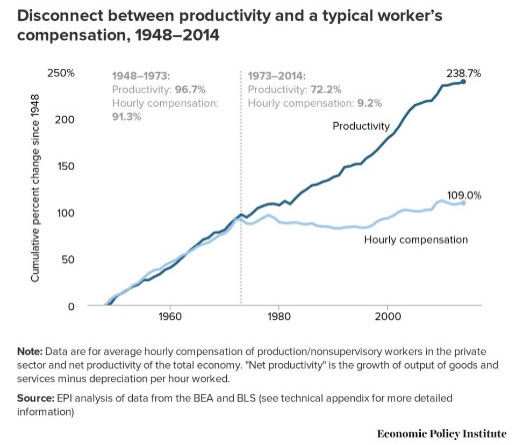
NAVIGATION

Hi, I’m Ryan
When I first heard the term “quiet quitting,” I quickly found that I could relate to it and had lost count of the number of friends who had done just that — quietly quit their positions at work. That’s what first interested me in this topic.

If you spend any time on TikTok these days, you’ve probably heard people talking about quiet quitting. I can relate to the sentiment in my previous career. I was working in HR and had been crushing my metrics at work.
 It came time for my annual review and when I sat down with my boss, the VP of Human Resources, she was so impressed and thrilled with my work that year. Then she told me, “I can’t give you the top marks on your employee review — I don’t want people to think HR is playing favorites. That also means I can only give you a 2% raise.”
It came time for my annual review and when I sat down with my boss, the VP of Human Resources, she was so impressed and thrilled with my work that year. Then she told me, “I can’t give you the top marks on your employee review — I don’t want people to think HR is playing favorites. That also means I can only give you a 2% raise.”
I was stunned that she admitted that I earned and deserved a great result on my review and that in the same stroke, I was being cut out of a few thousand dollars in pay for political optics.
That was the day I quiet quit.
What Is Quiet Quitting?
Simply put quiet quitting is where you don’t outright quit your job, you’re just not going above and beyond while still doing the duties on your job description. The concept comes as a direct opposition to hustle culture and climbing the corporate ladder.
That was where I found myself in my past career, where going above and beyond wasn’t even recognized, let alone rewarded. Instead of resigning my position or looking for another job, I slow rolled my work to make sure I was getting what needed to be done in my position done, but no more.
@zkchillin On quiet quitting #workreform ♬ original sound – ruby
@alifeafterlayoff More people are “quiet quitting” instead of leaving. #quitmyjob #corporate #corporatelife #job #jobburnout #greatresignation #career #workthisway ♬ original sound – Bryan Creely – Career Coach
How Do You Quiet Quit?
For each person it might look different, but the important thing to know is that quiet quitting isn’t about being lazy or unwilling to work. It’s more about finding an even keel with your job in a way that achieves your duties while balancing your well-being.
 So when it comes to how you quit quietly, you want to think about what items need to get done in order to satisfy your job requirements and then nothing more. It’s also about establishing healthy boundaries at work and in life. In a world where we are constantly connected, you need to make sure that you defend your boundaries after normal work hours.
So when it comes to how you quit quietly, you want to think about what items need to get done in order to satisfy your job requirements and then nothing more. It’s also about establishing healthy boundaries at work and in life. In a world where we are constantly connected, you need to make sure that you defend your boundaries after normal work hours.
What I’ve found is that those who get upset about this are often the worst offenders when it comes to employers. I can remember when I had a bad boss who got mad at me for not replying to an email sent at 3 a.m. until 6 a.m. on a Sunday.
Conversely, my current employer was very appreciative when I stayed late for a meeting with a client in another time zone once a year. The difference is night and day.
Why Quiet Quitting Instead Of Quitting Directly?
The reason you don’t quit outright is that your situation with your job isn’t toxic or causing you to jump ship, but you’re finding the most efficient amount of input to achieve the output (your pay). In a weird way, it’s a very capitalistic approach to work.
For employers, the work that needs to get done is done well, on time, with good quality in a manner that’s sustainable for the employee. Employers have just become over reliant on employees going above and beyond without additional compensation.
So many people are quiet quitting because they realize that their efforts beyond their core duties don’t amount to much in terms of additional compensation.
How Is Quiet Quitting And The Great Resignation Related?
With the Great Resignation, there was an inflection point for many as people found themselves reconnecting with family, free time, and a boost in funds. Being quarantined at home gave people some time to take stock of things like we haven’t been able to in a very long time.
In a world that is always on the move and going faster and faster, the time at home gave us time to reflect on things. That was a clarifying experience for many. It also brought out companies and boss’s true colors: great companies shined, while bad bosses acted so poorly many people threw up their hands and walked out.
Why So Many People Want To “Quiet Quit” Their Jobs
If people cannot work diligently at a job and as a reward for a job well done afford a basic place to live, have access to healthcare that won’t bankrupt them, and put a little away each month for retirement or a rainy day, what’s the point?
That’s the question many people from all generations are asking themselves.

What Does Quiet Quitting Mean For Companies And Bosses?
I’m in the unique position where I am currently an employer, an employee, and also a contractor. I’ve also worked in HR having hired more than 500 people and in management where I’ve had up to 30 people reporting to me.
 The entire issue of pay versus productivity is very much the chicken or the egg issue. In our society, the powers that be, the government, and industry have not kept wages matching the productivity of their workers. This means that those people have less money to spend on goods and services, which in turn mean those companies have less to spend on their workers, and so the spiral goes down.
The entire issue of pay versus productivity is very much the chicken or the egg issue. In our society, the powers that be, the government, and industry have not kept wages matching the productivity of their workers. This means that those people have less money to spend on goods and services, which in turn mean those companies have less to spend on their workers, and so the spiral goes down.
A few bad actors have really messed up the entire ecosystem where people could have been paid more and companies could have profited more too. It’s not a zero-sum game.
How we fix the current circumstances is difficult to say and frankly beyond my pay range, but I think it needs to start with good leadership, care for the people we work with, and a healthy dose of empathy.
As an employee, I want to do a good job and get paid well for it. As an employer, I want to be successful in business to the benefit of me and my employees, to enable them to live good lives too.
Your Turn
- What do you think about Quiet Quitting?
- Have you quietly quit your job?

I feel really frustrated by the name of this concept – this is not “quitting!” This is doing your job and saying no to the exploitation of contemporary capitalism. I call it “working to my wage.”
Everytime I make a significant boost in my wages either taxes go up, inflation goes up, or heathcare goes up. So now I make 72k in CT as a single father and even this is not enough to get by comfortably.
I’ve completely pulled back and do the bare minimum. This world does not need billionaires.
About 7 years ago I started to reanalyze all aspects of my work-life. The corporate ladder I was climbing was against the wrong wall. I was blessed to be working for a great boss and when I told him what I wanted he mentored and encouraged me. Now I enjoy my work, I get paid a lot more, and I work fewer hours. Wish everyone could have such support!
I don’t get the name “quietly quitting”..it’s just about doing your job. I put in 100% at my job and go above when I can and I’m up for it. I also balance my personal life and put in 100% into my family. It is called boundaries. I’m not quitting anything..In setting boundaries
I never made a living wage at my primary healthcare job. Being a single parent with no other financial support at times, I was forced to work 2-4 extra jobs just to get basics for my kids because I didn’t want to take gov’t handouts.
Working beyond my means at tasks that other shifts couldn’t complete because of staff shortages was work for the sake of patients, residents, or clients
that took its toll on me and robbed me of special
memories with my kids at times.
I couldn’t see where to set boundaries and still survive, until after I collapsed onto the floor from exhaustion.
Then someone taught me how to quit doing more than I should, like carrying the burden of other shifts on a regular basis.
I learned to focus on my patients, clean up my work first, helping with the other messes only after my work was done and if I would be put on time.
Management was able to see more clearly where needs were because I, and others like me, stopped wearing ourselves out working, even off the clock.
While I really appreciate the comments about boundaries, I believe this topic helps to affirm those of us who need to quit overachieving and leave enough energy for other jobs plus relationships (the most important job of all).